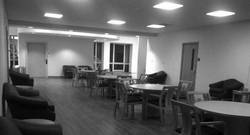A week prior to Hurricane Irene, a heavy rainstorm flooded Howard Hall’s first floor with at least 10 inches of water.
“There was no significant damage anywhere else on campus; there were a few minor leaks here and there but Howard Hall was the most serious problem,” said Patti Swannack, Vice President of Administrative Services. “We had to remove all the carpet that was on the level, which was scheduled to be removed during the fall semester anyway, and computer equipment.”
According to Edward Christensen, Vice President for Information Management, “Although some servers were shut down and the datacenter was placed on emergency generator power all essential services remained in operation.”
The 24 hour computer lab and Help Desk were briefly relocated, however all systems and services were back online for the start of business on Monday August 22.
“The hard work and cooperation of Information Management and cooperation of Information Management and Facilities Management ensured the crisis did not become an emergency, and that the recovery was expeditious,” Christensen said.
However, damage from water to more than 100 computers and many more peripherals and supplies presented challenges to the start of the semester as many of these machines were destined for classroom and lab use. “At the same time, we have also doubled our efforts in preparing for our move in the Edison addition, a move expected to begin soon,” Christensen said.
The following weekend, August 2728, was the arrival of Hurricane Irene. Days before it hit New Jersey, rain and wind predictions, tips for keeping homes safe, and overall concern, filled the TV news stations.
The University experienced minimal damage during the hurricane with a fallen tree on each side of campus, and the debris was cleared.
New Jersey was declared to be in a State of Emergency and certain towns, especially those along the shoreline, were urged to evacuate. The category one hurricane brought floods, fallen trees and power lines, and damaged cars.
Sara Tomas, sophomore, was one of the many who experienced the ferocity of the storm.
“I didn’t have to evacuate, but they told me I was better off if I did. My friends however were evacuated from their homes because they lived in the middle of rivers and lakes and were a block or two away from the ocean. When they returned, their houses were completely flooded and outside it was waist high. One of their neighbors even kayaked into their house,” Thomas said. Thomas had no power for two days and recognizes that others were without power for more than a week. The storm triggered nostalgia as the familiar landscape had changed rapidly.
“I’ve lived in Long Branch all my life and it is so weird to see the beach so flat and the tide like this. Don’t get me wrong, it’s gorgeous at night but it doesn’t feel like the beach I know when I was younger,” Thomas said.
In the aftermath of these storms people feel the need to prepare for this kind of situation should it occur again. Chief of MUPD, William McElrath, shed some light on the importance of safety in emergency situations.
“Don’t walk or drive through flooding water because although it may look shallow, there may be holes or debris underneath. Drowning is the number one cause of death during rain storms for this very reason,” McElrath said.
Additionally, he advises to be cautious around down power lines.
Also, for students living at home, should there be a gas leak, it is suggested that one turns off the gas, especially if the basement is flooded. During gas leaks it tends to be unsafe to use lit candles, as well.
Students living on campus however, will not have to worry because the University will take care of any gas leaks, and candles are not allowed in residence halls as is.
Students can call the University’s emergency phone line at 732263 5900 if necessary. Additionally, students can register to receive emergency notifications on cellular and home phones.
During the last few weeks of summer, a time usually spent relaxing on the beach and preparing for the upcoming semester, the East coast was bombarded by rain storms while civilians prepared for the consequences associated with record-breaking weather.
PHOTO COURTESY of Blaza Nowara

